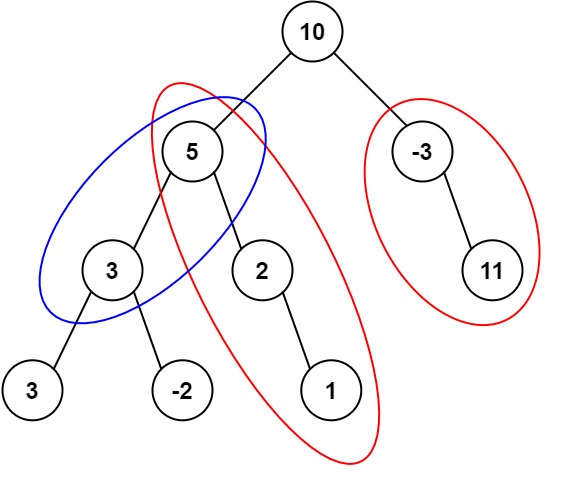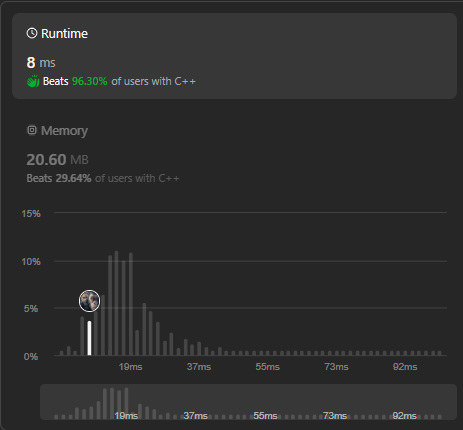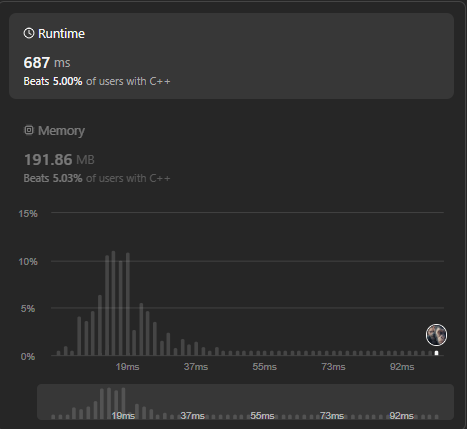https://leetcode.com/problems/path-sum-iii/description
Path Sum III - LeetCode
Can you solve this real interview question? Path Sum III - Given the root of a binary tree and an integer targetSum, return the number of paths where the sum of the values along the path equals targetSum. The path does not need to start or end at the roo
leetcode.com
Q. Tree 노드가 주어질때, 해당 노드의 leaf를 향하는 연속된 구간합이 targetSum 이 되는 구간의 빈도를 구하라.

Solution.
가장 직관적인 solution은 root에서 leaf로의 모든 dfs를 진행하면서 과정의 구간합이 target sum이 되는 구간을 찾고, 이 검색을 아래 다른 leaf들로 확장한다.
void dfs_search(TreeNode* node)
{
if(node == NULL) return;
sum += node->value;
if(sum == targetSum)
++retCount;
dfs_search(node->left);
dfs_search(node->right);
}
int pathSum(TreeNode* root)
{
dfs_seach(root); // 루트를 기준으로 이 검색을 하고
pathSum(root->left); // 각 child들에게 이 검색을 다시 건다.
pathSum(root->right);
}
그냥 봤을때 TC가 O(NxN) 혹은 최소 O(NxlogN)이 나온다.
뭔가 O(N)에 해결하는 더 좋은 알고리즘이 있을 것 같다.
음... 가만, 보니까 이 문제를 어디선가 본 것 같다.
https://artofcom77.tistory.com/198
[Good] 560. Subarray Sum Equals K
https://leetcode.com/problems/subarray-sum-equals-k/description/ Subarray Sum Equals K - LeetCode Can you solve this real interview question? Subarray Sum Equals K - Given an array of integers nums and an integer k, return the total number of subarrays who
artofcom77.tistory.com
그렇다.
이 문제는 음수를 포함한, 구간합을 구하는 문제의 tree 버젼 인 것이다.
다시 문제로 돌아가서,
원 문제의 풀이대로, 풀어본다.
void pathSum_helper(TreeNode* node, long sum, int& ret, unordered_map<long, int>& mapFreq, const int targetSum)
{
if (node == NULL) return;
// Calculate Sum.
sum += node->val;
// Search.
if (mapFreq.find(sum - targetSum) != mapFreq.end())
ret += mapFreq[sum - targetSum];
// Add to Buffer.
mapFreq[sum]++;
// Keep Looping.
pathSum_helper(node->left, sum, ret, mapFreq, targetSum);
pathSum_helper(node->right, sum, ret, mapFreq, targetSum);
mapFreq[sum]--;
if (mapFreq[sum] == 0)
mapFreq.erase(sum);
}
int pathSum(TreeNode* root, int targetSum)
{
int ret = 0;
unordered_map<long, int> mapFreq;
mapFreq[0] = 1;
pathSum_helper(root, 0, ret, mapFreq, targetSum);
return ret;
}
다만, 이 문제에서 추가로 유의 해야 할 점은,
sum의 범위를 long으로 해야 문제가 요구하는 범위 filter에 걸리지 않는다.
또한,
sum frequency map buffer를 함수에 pass in 해 줘야 하는데, 값으로 전달하냐, reference로 전달하느냐에 따라 속도 차이가 크다.
다음이 reference로 전달한 결과 이다. (8ms)

아래는 값으로 전달한 결과이다. (687ms)

아는 것 이상으로 차이가 크다.
반드시 reference로 전달 하도록 한다.
'Leetcode > Challenges' 카테고리의 다른 글
| [Graphs-DFS][Medium] 1466. Reorder Routes to Make All Paths Lead to the City Zero (0) | 2024.02.09 |
|---|---|
| [DP-MultiDimensional][Medium][Good] 1143. Longest Common Subsequence (1) | 2024.01.24 |
| 560. Subarray Sum Equals K (1) | 2023.12.24 |
| [Stack][Medium] 394. Decode String (0) | 2023.12.14 |
| [Array/String][Medium] 238. Product of Array Except Self (0) | 2023.11.27 |